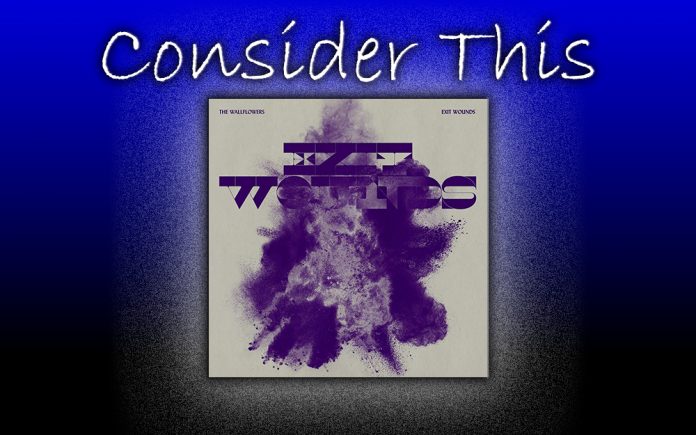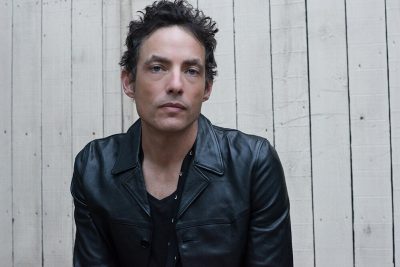
By Eleni P. Austin
It must be incredibly difficult to be an aspiring musician if your parent is already a famous one. Does your pedigree help or hurt you? Sure, you might bypass the grinding ordeal of breaking into the music business. Working a shitty day job and toiling away in tiny venues and dive bars, hoping your music will be heard by the right people. Still, name recognition means you’re held to a higher standard.
Rosanne Cash went outside the Nashville establishment to deflect accusations of nepotism. Reluctant to compete with the towering legacy of the Beatles, musicians like Sean Lennon, Dhani Harrison and Zak Starkey maintain low profiles within the music industry. Julian Lennon’s debut topped the charts in the early ‘80s, these days he channels his creativity into his photography.
Imagine Jakob Dylan’s dilemma. His father, Bob, is arguably one of the most important songwriters of the 20th century and beyond. As the youngest of Bob and Sara Lownds’ five children he was bitten by the music bug at an early age. Born in Greenwich Village, New York in 1969, he grew up in Malibu attending private schools. Raiding his older brothers’ record collections he became an aficionado of Punk and Post-Punk acts like Buzzcocks, Jam and the Clash. It that last group, touted by their record label as “the only band that matters,” that inspired Jakob to begin playing music and writing songs.
By the late ‘80s Jakob had cycled through a few indie bands, including The Bootheels (which surreptitiously referenced one of his dad’s best known songs, “Tambourine Man”), with Luther Russell and his childhood pal, Tobi Miller. When that band fell apart, he and Tobi started The Wallflowers. Originally known as The Apples, the first incarnation of the band included Barrie Maguire on bass, Peter Yanowitz on drums and finally, Rami Jaffee on keys.
Once they officially became The Wallflowers, they gigged around the usual Sunset Strip clubs, Gazzari’s, The Whisky and The Viper Room. Jakob was up front, on guitar and lead vocals, but as part of an ensemble, the pressure didn’t rest squarely on his shoulders. By the time they signed with Virgin Records the band was adamant that their first album should reflect their live sound, bare-bones and unfussy. Producer Paul Fox (XTC , Robyn Hitchcock, Sugarcubes, 10,000 Maniacs) adhered to that edict. Released in 1992, even though it garnered positive reviews, commercially, it sank without a trace.
Virgin suffered a regime change and the band asked to be released from their contract. Almost immediately they inked a deal with Interscope. Finding an empathetic producer was crucial to making the record The Wallflowers heard in their heads. Jakob sent off some music to T-Bone Burnett and he agreed to produce their second album.
Ironically, T-Bone was well-acquainted with the Dylan family. The native Texan’s first group, The Alpha Band was part of a musical collective Bob took on his Rolling Thunder Review tour, along with a cavalcade of superstars like Joni Mitchell, Joan Baez and Ramblin’ Jack Elliott. T-Bone earned his stripes amongst the glitterati. A critically acclaimed solo career followed, but more importantly, he began making a name for himself as a producer. From Los Lobos and Elvis Costello to Counting Crows, the BoDeans and Sam Phillips, he proved to be a simpatico partner in the studio.
Bringing Down The Horse arrived in 1996 and it was well worth the wait. The music echoed antecedents like The Band, The Byrds, Tom Petty & The Heartbreakers, and yeah, even some Bob Dylan. It also fit in well with rootsy acts like the Jayhawks, Wilco and Son Volt. The album slowly climbed to the top of the charts, mostly on the strength of indelible singles like “6th Avenue Heartache” and “One Headlight.” It also won two Grammy Awards and Jakob was feted in the pages of Rolling Stone and Spin.
In the ensuing years The Wallflowers continued to release albums and tour. After much gestation, Breach arrived in late 2000, followed by Red Letter Days two years later and Rebel Sweetheart in 2005. Although each record was well-received, none reached the commercial heights of Bringing Down The Horse.

The band took an extended hiatus and Jakob recorded two solo albums. Reconvening in 2012, they returned with Glad All Over and hit the road. Once they finished touring, Jakob concentrating on producing the Echo In The Canyon documentary. An homage to the nascent Laurel Canyon sound of the mid ‘60s, it featured Tom Petty’s final interview and musical contributions from Beck, Fiona Apple and Cat Power, just to name a few.
Almost from their inception, The Wallflowers have endured myriad line-up changes. Tobi Miller left after the first album, Rami Jaffee remained until 2005 and briefly returned from 2013 to 2015. Not unlike Chrissie Hynde with the Pretenders, Jakob has remained the architect of The Wallflowers’ sound. The current iteration of the band includes Aaron Embry on keys, Brian Griffin and Mark Stepro on drums, Whynot Jansveld on bass and Val McCallum (a world-class singer-songwriter in his own right) on guitar. Nearly a decade after the last Wallflowers effort, they’ve just released seventh album, Exit Wounds.
The record kicks into gear with “Maybe Your Heart’s Not In It No More.” Buoyant acoustic guitars sidle between searing electric riffs, shimmery keys and a kick-drum beat. Jakob wraps his rough-hewn tenor around lyrics that address the terror of losing touch with your muse; “There’s no fire beneath the smoke, no one’s got you up by the coat, not a razor up to your throat, you can go anytime, through any door, maybe your heart’s not in it no more.” The instrumentation expands on the break, adding warm piano notes, bottleneck guitar and downy soft organ. Val unspools a spiraling solo that leads to an epiphany of sorts; “Out of contact, out of zone, off the backbeat, off the bone, away from the wolfpack, on your own, dance together, dance alone/There’s trouble outside, trouble in, show some hustle, show some skin, whatever was has already been, let this new day do its thing.”
On a record that feels mostly pensive and introspective, a couple of tracks tackle some affairs of the heart. On “I’ll Let You Down (But Will Not Give You Up)” sun-dappled acoustic guitars and stinging electric riffs lattice atop spidery bass lines, gossamer keys and a tick-tock beat. A chaotic bus ride serves as a metaphor for a doomed relationship; “We’re too stoned to notice there’s no ground left to be tucked, down under the wheels that have long since abandoned us, like riderless horses, they’re all returning back to wherever they’re from, it’s impossible now that we’ll be anything but crushed.” A willowy guitar solo, suffused with heartache and regret, stretches out across the break. Although Jakob’s mien is stoic and indifferent as he catalogues the continued sturm und drang, his voice takes on a hopeful note, insisting on the chorus, “I’ll let you down, but I will not give you up.”
“Darlin’ Hold On” locks into a Country/Folk groove that is accented by sepia-toned keys, lowing bass, feather-light guitar and brushed percussion, as Jakob trades verses with alt.country chanteuse Shelby Lynne. The lyrics speak to the resilience of a longstanding relationship. “You were born on your feet, with the stem of a rose between your teeth, from a cloud of golden air where the sky meets the streets/You were already wise to a world that’s bitter as it’s sweet, with both kinds of magic and God never gets his sleep.” Her smoky contralto intertwines with his back-porch croon on the chorus; “Darlin’ hold on, I am far but I’m not gone, hold on, I am always where you are, hold on, I am far but I’m not gone.” Plaintive piano notes appear on the bridge as weepy Coodercaster notes dart in and out of the mix. The Wallflowers step out of their comfort zone on both “Move The River” and “Who’s That Man Walking ‘Round My Garden,” and the gamble pays off. If the late Phil Spector ever collaborated with the Raconteurs, it might sound like the former. The song’s arrangement is wily and a touch pugnacious. A kinetic backbeat connects with rippling castanets, boomerang bass lines and ricocheting guitar riffs. The electro-static instrumentation is matched by opaque lyrics that can’t help but notice the world has turned a corner; “The sky’s the color of an ashtray, full of Van Gogh’s yellow clouds, and those aren’t Gospel songs you hear being sung in the crowd/May a ladder appear in the smoke through a hole we can climb, see the torches on the battered boat, of a ghost ship without any guide.” Beatific backing vocals and searching piano chords swaddle the expansive chorus as Jakob quietly insists “there’s no way around it…we’re gonna move the river.” The guitar solo on the break briefly swings like a sultan before it’s supplanted by some razor-sharp slide guitar.
The latter walks in the footsteps of Jakob’s longtime friend and mentor, the late Tom Petty. Slashing guitars partner with plinky, Honky-Tonk piano, shuddery bass lines and a knockabout beat. Jakob’s authoritative growl nearly approximates the nasal drawl of the Gainesville’s favorite son. Here, he effortlessly slips into the skin of an aggrieved husband; “I’m in the city got two jobs at once, I got the kind of things that only come from working like the devil till the sun comes up, I got your back , I got your front, I take the city bus and then the train, walk three miles uphill both ways, now when I get home I don’t wanna complain, but tell me who’s that man walking ‘round my garden.” He confronts his cuckold status, and permanently marks his territory; “I keep out of your roses and I expect the same, next hole you dig gonna be your grave, call me a doctor and my mother to explain why I killed that man walking ‘round my garden.” Fuzzy guitars bookend each verse, and on the chorus, boisterous handclaps, woo-hoo-y backing vocals and some roller-rink organ undercuts the song’s homicidal tendencies. The album’s best tracks arrive back to back. The jingle-jangle guitars that open “Roots And Wings” are augmented by pillowy keys, tensile bass and a snappy, rat-a-tat rhythm. Lyrics conjure a spent Svengali whose pupil has outgrown her teacher. Scabrous sarcasm is his weapon of choice; “I showed you how to swing, and I showed you how to strut, that’s my mojo you’re using, that’s my wine getting you drunk/Was I that broke you in, I got you clean, clipped and cut, you’re a mule among horses, I took you when God stood you up.” Flicker-y guitar riffs punctuate each taunt and jeer, but the bitter cedes too sweet on the break when Val unleashes a honeyed slide solo. The arrangement revs up to a stunning crescendo before powering down on the last verses and closing with a tart bottleneck coda.
On “I Hear The Ocean (When I Want To Hear Trains)” chunky guitar chords are matched by stately piano, angular bass lines vaguely Latin percussion and a thwacking beat. The sanguine melody and sunny arrangement belies lyrics that plumb the depths of the eternal disconnect; “I’m in the desert now with this flag being raised, this is surrender and these are the cruelest of days, I’m not working with a net before I pay, I hear the ocean when I wanna hear trains.”
Other interesting songs include the slow-cooked Soul of “Wrong End Of The Spear” and “The Dive Bar In My Heart” which weds winsome melody and instrumentation to mordant lyrics like “Every dog has it’s day, then don’t I too get a bone?” The record closes with “The Daylight Between Us.” By turns bitter and biting, mercurial and brutally honest, “Daylight…” blends strafing guitars, a wash of keys, majestic piano notes, thready bass lines and a sturdy backbeat. Lyrics unspool a tawdry narrative worthy of Charles Bukowski or Steely Dan; “The men were all drinking wine, the women they split to smoke French cigarettes, do a couple of rails, sit around and bitch, lie down and get sick, in the morning there’s a line of ashes in the sink, and bruises on her lips, the candles that were lit melted on the cake, as if they were over it/Now she’s looking for the dog and a last hit, for water and a first aid kit, but it used to be enough to taste it, but that’s before we were always wasted.” It’s a spiky end to an amazing record.
Produced by multi-instrumentalist and ex-Marvelous 3 front-man Butch Walker (Pink, Taylor Swift, Weezer, Green Day), the album was recorded in the days leading up to the pandemic. The band held off on releasing it in 2020 because they “didn’t want to put it out during a time of such uncertainty.” This is The Wallflowers’ most assured effort since Bringing Down The Horse. Jakob knows his way around a hook and his facility for language and storytelling is baked into his DNA. Political, personal, deft, economical, expansive cutting and sublime, Exit Wounds is one of the best albums released this year.












































